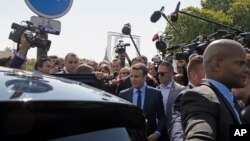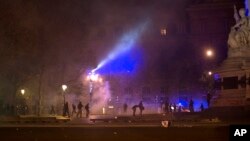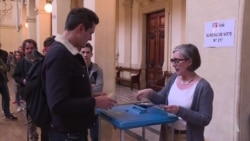One day after French voters put her in a presidential runoff with centrist candidate Emmanuel Macron, nationalist, anti-immigration candidate Marine Le Pen has announced that she is temporarily stepping down as the leader of her party so she can run as a candidate for "all the French."
In a move aimed at broadening her appeal, Le Pen said on French public television, "Tonight, I am no longer the president of the National Front. I am the presidential candidate,'' adding that she wants to be "above partisan considerations.''
Disrupting establishment
In what analysts describe as a political earthquake in France, Le Pen received 21.5% of the French presidential vote, while Macron garnered 23.8% of the vote. A winner needs an absolute majority, so a second round will be held on May 7.
It is the first time in the history of the modern French Republic that the presidency will be held by a member of a non-traditional party, highlighting a deep anti-establishment sentiment that ultimately could determine whether France remains a part of the EU or follows an independent path like that of post-Brexit Britain and the United States under Donald Trump.
"In one year, we have entirely changed French politics," Macron said at a victory rally Sunday night.
Macron, a 39-year-old center-left former economy minister who is pro-EU and pro-business, led pre-election polls despite his previous association with unpopular Socialist President Francois Hollande. The appeal of his year-old En Marche! movement lies mainly in France’s prosperous urban areas, where globalism has benefited many.
His challenge is to galvanize support of centrists and the left, including members of France’s fractured Socialist party, and convince voters he does not represent a continuation of Hollande’s policies.He received congratulations from EU officials.
Le Pen, who wants France out of the European Union, has succeeded in winning over large numbers of former leftists and centrists.
News that Le Pen advanced to the second round sent left-wing protesters into Paris streets, where they clashed with police.
Eventful campaign
Among the top contenders in the 11 candidate field was former Prime Minister Francois Fillon, a center-right social conservative whose bid was damaged by allegations of creating fake jobs for close relatives.Conceding defeat on Sunday, he endorsed Macron.
Some 50,000 police officers backed by 7,000 soldiers, including special forces, were deployed to the streets following a terrorist attack days earlier that was claimed by the Islamic State terrorist group.
The shooting along the iconic Champs-Elysees in the heart of Paris left one police officer dead and several other people injured.
Observers thought the attack would benefit Le Pen.
In a tweet one day after the Champs Elysees shooting, U.S. President Trump said, “The people of France will not take much more of this.Will have a big effect on presidential election!”
Analysts and voters interviewed saw this as the most unpredictable election since World War II.One third of voters were undecided just days before the balloting.
In the last few weeks before the vote, far-left candidate Jean-Luc Melenchon surged in the polls and so did discussion of the previously obscure candidate in social media.
Among the ways his campaign lured young voters was through the release of a video game in which a player pretending to be Melenchon is shown in a battle against the rich and powerful.
Anger at the establishment is the sentiment driving voters in an election in which security, France’s lagging economy, its 10 percent unemployment rate, and Islamist extremism are issues on the minds of those on the left and on the right.
That, say analysts, is what influenced large numbers of people, including some of the middle and upper class residents of Paris, to vote for candidates of the extreme.
“Some of them for the thrill of it.It’s the principle, you know.Like playing Russian roulette, but politically.Some others it would be because they despise the elite of this country,” said Thomas Guénolé, a political analyst in Paris, told VOA.
WATCH: Macron, Le Pen Head to Final Round of French Presidential Race
Socialist President Francois Hollande announced he would not to run for reelection after his approval ratings sank to 4%, something analysts widely attribute to a string of terrorist attacks in France and a stagnation of economic growth during his tenure.Hollande is the first incumbent president not to seek reelection in the history of the modern French republic.
Hollande on Monday urged people to back Macron and reject Le Pen, whose place in the run-off he said represents a "risk" for France.









